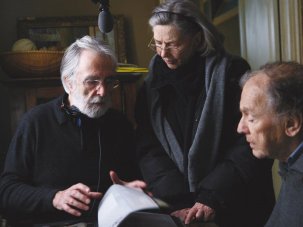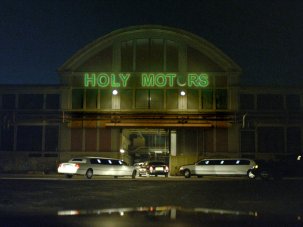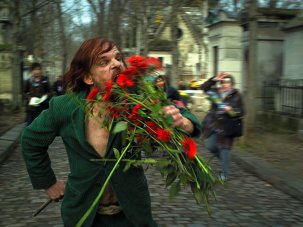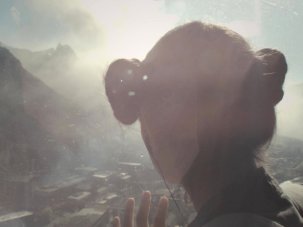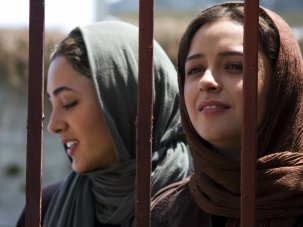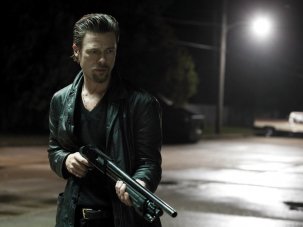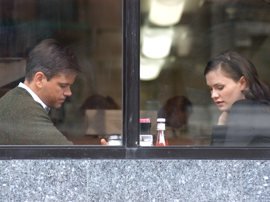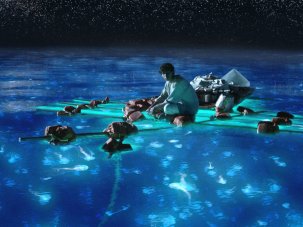Full web edition
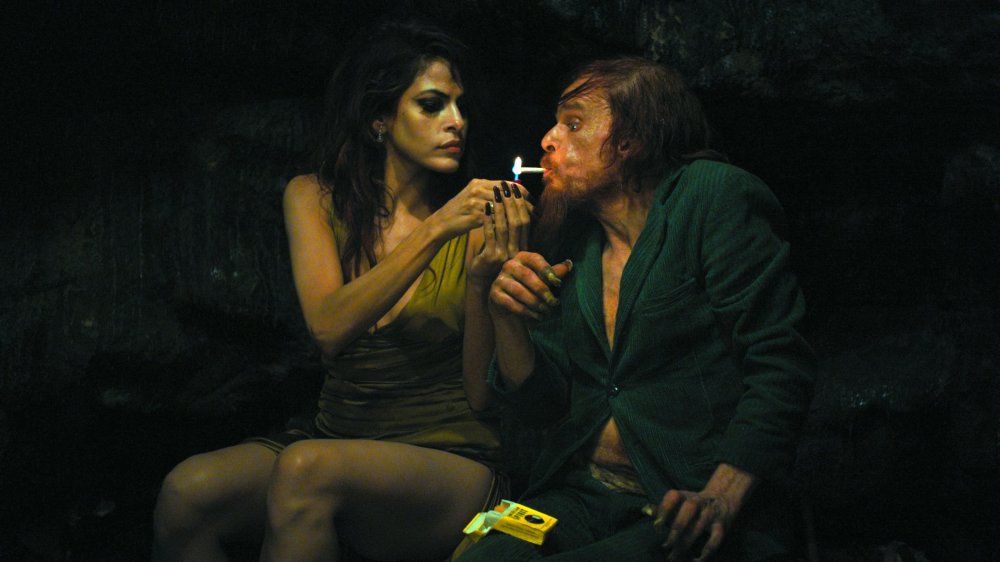
Holy Motors
Peter Hames
Academic and critic, UK
House with a Turret
Eva Neymann, Ukraine
Neymann’s second adaptation of a story by Friedrich Görenstein is a sensitive recreation of a young boy’s journey in search of the house where he and his mother had lived. A child’s experience of war is movingly conveyed through Rimvydas Leipus’s striking black-and-white cinematography
Caesar Must Die
Paolo & Vittorio Taviani
The Taviani brothers’ new film about the performance of Shakespeare’s Julius Caesar by prisoners in a maximum-security jail gives life to a world normally closed off through stereotype.
You Ain’t Seen Nothin’ Yet
Alain Resnais
More theatre – this time Jean Anouilh’s Eurydice – forms the basis of Resnais’s impeccable but boldly experimental work as a group of actors interact with a screened version of the play.
Imagine
Andrzej Jakimowski, Poland/Portugal/France/UK
In his English-language follow up to 2007’s Tricks, Jakimowski confirms his position as one of the most distinctive of the new Polish directors. The story of a teacher (Edward Hogg) at a school for the blind in Portugal and his use of echolocation, it’s also a sensitive love story and makes good use of its mainly UK-based blind actors.
I’m Going to Change My Name (Alaverdy)
Maria Saakyan, Armenia/Russia/Denmark/Germany
Saakyan’s second feature is an impressive recreation of the world of a 14-year-old girl, Evridika (Eurydice again), mixing reality with a dream world of images and poetry.
Highlights
Most distinctive event of the year was the screening of Martin Fric’s little known 1929 Czech film The Organist of St Vitus’ Cathedral (Varhaník u sv. Víta) as part of the London Czech Centre/Barbican programme, with jazz pianist Najponk (ie Jan Knop) – a carefully modulated melodrama based on a screenplay by the poet Vitezslav Nezval.
Otherwise, on the DVD front, plaudits to Eureka for their release of Epstein’s Coeur fidèle, and to Second Run for their continued pursuit of classics from the archives of Central Europe.
Nick Hasted
Critic, UK
Once upon a Time In Anatolia
Nuri Bilge Ceylan
Long, quiet and rambling, Ceylan’s metaphysical police-procedural never ceases to grip, and slowly sculpts a sense of human mystery with masterful care.
Lawless
John Hillcoat, USA
This Nick Cave-scripted and co-scored hillbilly saga revels in simple, pulpy pleasures and dubiously stark morality, offered with shameless romantic conviction and thundering vigour, which makes castration seem a reasonable act.
A Royal Affair (En kongelig affaere)
Nikolaj Arcel, Denmark/Sweden/Czech Republic/Germany
One of Mads Mikkelsen’s two towering peformances of the year, alongside his work in Vinterberg’s The Hunt. He helps power a story of 18th-century Copenhagen court intrigue with a ferocious sense of social injustice and consequence.
Rust and Bone (De rouille et d’os)
Jacques Audiard, France/Belgium
Alongside its sensual intensity, this is one of the most astute films so far about the extreme options open to working-class characters at a time when community and economic survival are both under brutal attack.
London the Modern Babylon
Julien Temple, UK
Temple’s home-town tribute, released in time for but buried by the Olympics, is the underground version of Danny Boyle’s live-cinema Opening Ceremony epic: a surging, surprising, inspiring story of revels, race and riots.
Highlight
In the final five minutes of Matteo Garrone’s Reality, deluded reality-show wannabe Luciano (Aniello Arena) somehow stumbles through the looking-glass onto the Cinecittà Big Brother set. Abandoning the uncertain earlier tone of tragicomic satire, the ambient night-time splashes of the pool and the contestants’ careless laughter, so banally familiar from TV, become the sound of a higher realm, where Luciano becomes an invisible voyeur of cavorting gods. Soaring free from Gomorrah’s realistic constraints, Garrone suddenly touches the rarest space in cinema: the truly sublime.
J. Hoberman
Critic, USA
Haywire
Steven Soderbergh, USA/Ireland
Man can never escape from himself, per Goethe. For me, the film-related highlight of 2012 was the loss of the professional status I had enjoyed for more or less the last 33 years reviewing movies for New York’s venerable weekly the Village Voice – which, for me, was the best job in the world. In that sense, the new release that most impressed me was Haywire: the first movie I saw that I was inspired to write on, and knew I would no longer be able to – at least in the manner to which I had become accustomed.
Once upon a Time in Anatolia
Nuri Bilge Ceylan
The Turin Horse
Béla Tarr
For the record, the two movies released in the US last year that I found most impressive were these two totally immersive experiences.
Highlights
Since I’m a weekly reviewer no longer, and thus unbound by prior constraints, I’ll add two old movies that I saw during the last calendar year: Werner Schroeter’s The Death of Maria Malibran (1972), in a fully saturated new 16mm print, and Ivan Pyriev’s 1958 adaptation The Idiot, an equally florid example of cinema excess, seen at the Bologna Film Festival.
My most intense movie experience was orchestrating the projection piece Land Passion War of the Dead Christ Worlds on the big screen at New York’s Walter Reade Theater. (Thank you, Gavin Smith!)
Philip Horne
Critic, UK
Amour
Michael Haneke
An astonishing, courageous film about love and death – harrowing and rigorous as Haneke can make it, humane and involving through the extraordinary performances of Trintignant and Riva.
Moonrise Kingdom
Wes Anderson
Perhaps Anderson’s most perfectly balanced film since The Royal Tenenbaums, quirkily literary but seriously cinematic, funny and uncannily poignant.
Beyond the Hills
Cristian Mungiu
After the abortion story of 4 Months, 3 Weeks & 2 Days, Mungiu’s intelligent, insidiously terrifying and tragic exorcism drama set in a remote Romanian nunnery again shows his austere mastery.
The Descendants
Alexander Payne, USA
George Clooney’s performance is outstanding as the decent, much-beset Hawaiian hero in a welcome return for the admirable Alexander Payne after a seven-year gap.
Cosmopolis
David Cronenberg
Cronenberg’s dry, knowing version of Don DeLillo’s novel – a fantasia on financial and global crisis transacted in a traffic-snarled New York limo – not only shows that Robert Pattinson is an actor of considerable power, but takes us into a nightmare world I couldn’t help thinking might be all too real.
Highlight: Interviewing Michael Haneke in London, for The Telegraph: rewatching his films as an oeuvre was a transforming experience, and meeting him a rare privilege – he was friendly, funny, guarded and very interesting, especially about Ulrike Meinhof.
Alexander Horwath
Director, Austrian Film Museum, Austria
Five double bills:
Tabu
Miguel Gomes
+
Holy Motors
Leos Carax, France/Germany
Anton’s Right Here (Anton tut ryadom)
Ljubov Arkus, Russia
+
All Divided Selves
Luke Fowler
Amour
Michael Haneke
+
Paradise: Love
Ulrich Seidl
The Master
Paul Thomas Anderson
+
Something in the Air (Après mai)
Olivier Assayas, France
Leviathan
Lucien Castaing-Taylor & Véréna Paravel
+
Neighbouring Sounds
Kleber Mendonça Filho
Wendy Ide
The Times, UK
Beasts of the Southern Wild
Benh Zeitlin, USA
It should be easy to create magic with the medium of cinema, but all too often we’re too familiar with the tricks not to see the sleight of hand. But this was spellbinding and beguiling, and carried me along on the floodwater with all the debris and broken lives.
Amour
Michael Haneke
A profound and exquisitely acted study of a relationship. An intelligently dignified portrait of old age. Put simply, a masterpiece.
Argo
Ben Affleck, USA
Hollywood at its best. Slyly funny and nail-chewingly tense.
Killing Them Softly
Andrew Dominik
A trawl through the seediest side of the US economy that goes all out on sordid atmosphere and flick-knife sharp observation, it’s talky, street-smart and as tricky as the snakes and weasels that populate this blighted corner of America.
Children of Sarajevo (Djeca)
Aida Begic, Bosnia & Herzegovina/France/Germany/Turkey
I’m really excited by Aida Begic, who shows extraordinary promise. Her second feature is bold, confident and confrontational. I can’t wait to see what she does next.
Highlights
Secret Cinema’s extraordinary Prometheus event – the most ambitious they’ve yet attempted – was a playfully immersive and at times jaw-droppingly impressive attempt to recreate the world of Ridley Scott’s movie. I enjoyed it rather more than the film.
At Cannes I approached Anurag Kashyap’s five-hour Indian gangster saga Gangs Of Wasseypur – screening in Directors’ Fortnight – with a bit of a blitz mentality, but staggered out battered, bruised and high on its pummelling energy and scabrous wit. I hope there is a UK distributor bold enough to release it.
Nick James
Editor, Sight & Sound, UK
The five films listed below peaked only marginally above a longlist of 16 and I regret the exclusion in this strong year of the next 11: Barbara, Beasts of the Southern Wild, Caesar Must Die, Damsels in Distress, In the Fog, Margaret, No, Paradise: Faith, Sightseers, Silver Linings Playbook and West of Memphis.
Amour
Michael Haneke
Haneke’s most French work is a quiet meditation on what it’s like to lose, in old age, the person closest to you. Rarely has such a chamber piece been simultaneously so forensic yet heart-wrenching, and the film, with its sparky insightful performances from Trintignant and Riva, combines precision and lyricism like a late Beethoven quartet.
Beyond the Hills
Cristian Mungiu
The brilliant final scene cemented my faith in Cristian Mungiu’s sensitive and searing realisation of this story – based on real events – of a disruptive intruder persecuted by a religious community.
The Master
Paul Thomas Anderson
The struggle between business hucksterism and seat-of-the-pants adventurism has never been more vividly or beautifully illustrated than in Anderson’s tale of a war-shocked drifter (Joaquin Phoenix) taken in by a cult figurehead (Philip Seymour Hoffman).
Something in the Air (Après mai)
Olivier Assayas, France
Too often have the late 1960s been portrayed as near-caricature, which makes Assayas’s film a terrific, uplifting, breathing exception. It follows the fortunes of Gilles (Clément Métayer), a high-school art student torn between muses as all certainties are exploded.
Tabu
Miguel Gomes
Though a second viewing of this made me feel there’s too much cool distance between film and viewer, Tabu remains the most intellectually audacious and stylistically innovative feature of the year. Each of its parts – the semi-humourous African prologue, present-day Lisbon melodrama and romantic African past recalled as movie – is exquisitely apposite.
Highlights
I can’t compete with Mark Cousins’s annus mirabilis, but I am very proud of what my S&S compadres achieved this year: I loved announcing the countdown to the top-ten poll that saw Vertigo displace Citizen Kane (the organisation of which was a Sisyphean task, if ever there was one), I was wowed by the effort that went into the reorganisation and redesign of the magazine and the creation of the digital edition, both of which turned out better than I could have hoped. After that, Venice turned out to be the best big festival for films and Morelia the best festival experience (as you will later read). And the best stat is that more than half a million people visited our Top 100 film page on the web.
David Jenkins
Critic, Little White Lies, UK
Tabu
Miguel Gomes
This guy… I’ll follow him anywhere.
Beyond the Hills (Dupa Dealuri)
Cristian Mungiu, Romania/France/Belgium
Better than 4,3,2? I reckon so.
Museum Hours
Jem Cohen, Austria/USA
A wistful city symphony, a classical melodrama, some sage, intertextual musings on art history. Bliss.
The Last Time I Saw Macao (A Ultima Vez Que Vi Macau)
João Pedro Rodrigues & João Rui Guerra da Mata, France/Portugal/Macao
A hard-boiled transsexual crime saga plays out à la Marker. Like Museum Hours, this summons the heady romantic qualities of classic-era Hollywood and displaces the hell out of them.
Life of Pi
Ang Lee, USA
The year’s best film about death.
Highlights
It was great to see the UCLA restoration of Shirley Clarke’s jazz/dope odyssey The Connection (1962) at a midnight screening in snow-coated Berlin. There was also something fascinating about seeing an extremely grubby print of Kieslowski’s Blind Chance (1982) at the Busan Film Festival in a screen full of Korean students, most of whom left the auditorium in a state of visible shock.
At the beginning of October there was an amazing day-long cine-memorial for Chris Marker at London’s Horse Hospital, organised by Gareth Evans and Chris Darke. Fascinating rarities were screened, and each block of films came with a lovely, detailed introduction. But the most exciting aspect was that this modest space was absolutely filled to capacity, with people sitting on the floors, sharing chairs and standing in the aisles. Invigorating scenes!
Philip Kemp
Critic, UK
About Elly
Asghar Farhadi, France/Iran
Reaching us in the wake of the superbly judged A Separation, Farhadi’s previous feature confirms his status as potentially the finest director currently working in Iran.
Killer Joe
William Friedkin, USA
Good to see Friedkin continuing the unexpected revival of his career. In the title role, Matthew McConaughey is the embodiment of laidback, saurian menace.
Looper
Rian Johnson, USA/China
After the disappointment of The Brothers Bloom, Johnson redeems himself with a satisfyingly twisty and intelligent blend of SF and thriller.
The Kid with a Bike (Le Gamin au vélo)
Jean-Pierre & Luc Dardenne, Belgium/France/Italy
Hope out of desolation – who does it better than the Dardenne brothers?
Sightseers
Ben Wheatley, UK
Delectably pitch-black comedy from actor-screenwriters Alice Lowe and Steve Oram, with Ben Wheatley confirming his status as the most refreshingly offbeat and unpredictable of British crime-movie directors.
Highlight
Jean Grémillon During the Occupation: an unduly forgotten director gets the scrupulous Criterion treatment in this three-movie box-set.
Gabe Klinger
Critic, USA
Arnulf Rainer (1960) + Antiphon + Monument Film installation
Peter Kubelka, Austria
the war
James Benning, USA
differently, Mollusia (anders, Mollusien)
Nicolas Rey, France
American Falls
Phil Solomon, USA
To the Wonder
Terrence Malick, USA
These were not exactly films but site-specific performances, ephemeral and clandestine objects – total fucking UFOs. Every experience literally unrepeatable.
Lowlights
2012 was a bummer for the almost unthinkable concentration of one-of-a-kind creative talent that passed on: Vogel, Marker, Tony Scott, Hanoun, Sarris, Gazzara, Favio, Wakamatsu, Angelopoulos, Elliot Stein, Donna Summer, Adam Yauch, Paulo César Saraceni, Etta James, Stom Sogo, Eduardo de Gregorio… None, however, hit me quite as hard as the untimely death of filmmaker Carlos Reichenbach, who taught me and countless others that true cinephilia requires unwavering enthusiasm and selflessness. RIP Carlão.
Robert Koehler
Critic, USA
Tabu
Miguel Gomes
Leviathan
Lucien Castaing-Taylor & Véréna Paravel
Holy Motors
Leos Carax, France/Germany
Neighbouring Sounds (O Som ao Redor)
Kleber Mendonça Filho, Brazil
The Master
Paul Thomas Anderson
Highlights
Due to mitigating (including legal) circumstances, Kenneth Lonergan insists that the three-hour cut of Margaret released on the US DVD two-disc package (which includes the shorter theatrical release on Blu-ray) shouldn’t be referred to as the ‘director’s cut’. Better to call it the extended cut – or the superior cut. The new version reveals Lonergan’s magnificent epic of New York’s Upper West Side in the early years of the new century – and of the fascinating flawed and contradictory teen heroine at its centre – to be one of the great American melodramas.
It was João Pedro Rodrigues and João Rui Guerra da Mata’s year in many ways: a brilliant, quicksilver mystery with great formal playfulness (The Last Time I Saw Macao), the funniest and most mordant short film I saw this year (Morning of Saint Anthony’s Day) and a sublime recalibration of Cocteau’s La Voix humaine (As the Flames Rose) all reinforcing the sense that the two Joãos – partners in life – have become one of today’s most creative and productive filmmaking teams.
Mark Le Fanu
Critic, UK
I’m usually far behind the pack, but it’s always great to discover ‘new’ (for me) directors:
Carancho (The Vulture)
Pablo Trapero, Argentina/South Korea/France/Chile
The Minister/L’Exercice de l’état
Pierre Schöller, France/Belgium
One of the finest political thrillers of recent years.
Tabu
Miguel Gomes
A festival favourite of fragrant charm.
Highlights
The films I like best continue to be the old ones. BFI Southbank ran a superb season this summer of Japanese films by Yoshimura and Shindo, from which I was particularly struck by Clothes of Deception (1951), Night Butterflies (1957), A Woman’s Uphill Slope (1960) and the incandescent Onibaba (1964). At other times BFI Southbank came up with two films from this period I have been waiting to see for years: Minnelli’s Home from the Hill (1960) and Kazan’s Splendor in the Grass (1961) – magnificent, both of them. In Berlin I became acquainted – deliriously – with the work of Boris Barnet, and at Pordenone with two of the greatest ever ‘street’ films, newly restored: Pabst’s Joyless Street (Die freudlose Gasse, 1925) and Leo Mittler’s Jenseits der Strasse (1929).
Yet the real discovery of the year for me was Dreyer’s practically-never-shown Swedish film Two People (Tva människor, 1944). How long I’ve waited to see this movie! There it was, on an ordinary weekday at the Southbank. It’s always written off in the literature as an abject failure, but it’s superb. I urge you to see it if it comes your way.





